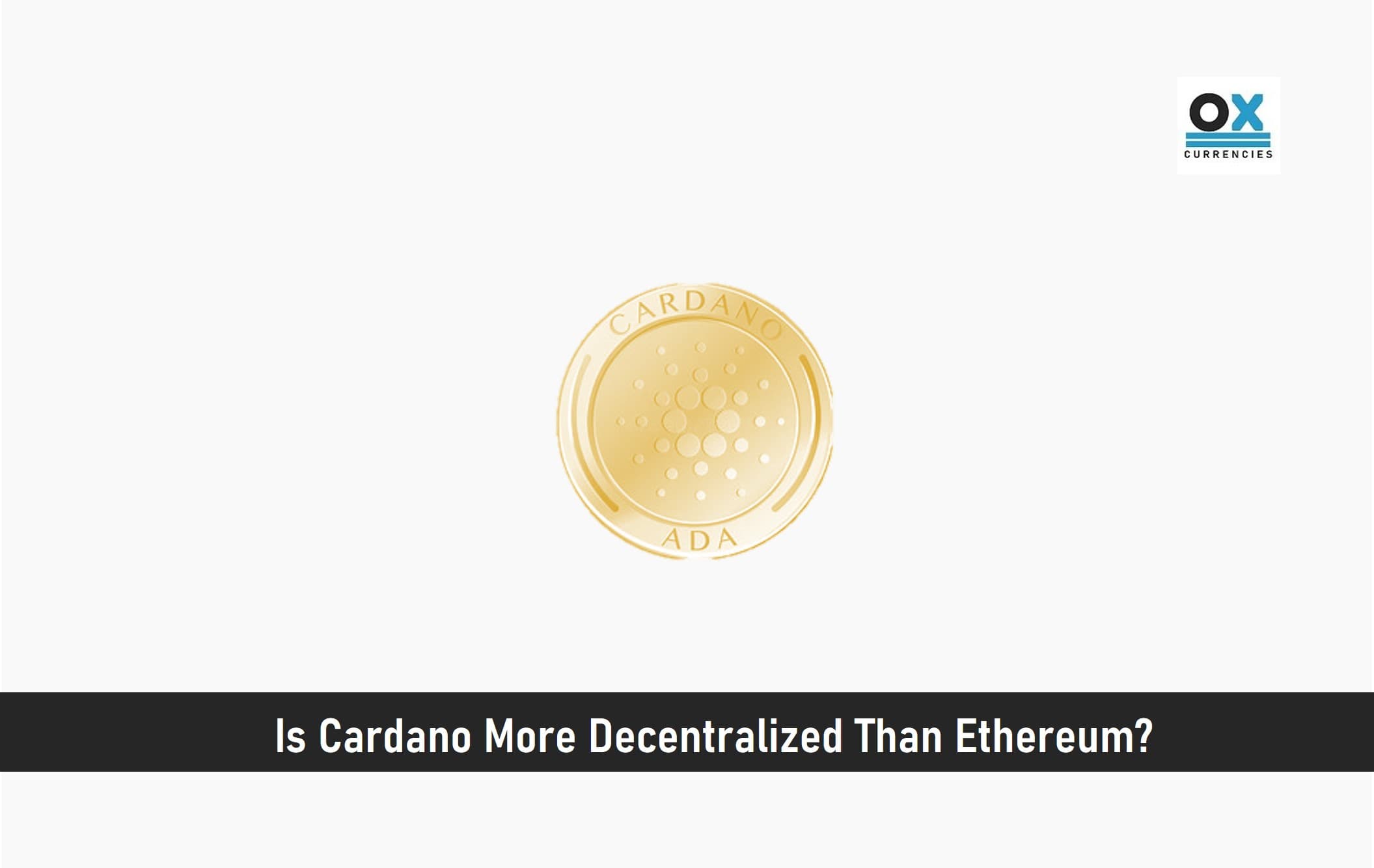
Cardano and Ethereum, like the majority of cryptocurrencies, assert that they are highly decentralized, but it can occasionally be challenging to determine just how decentralized they are.
However, not all cryptocurrencies are equally decentralized, even though decentralization is one of the driving forces behind the existence of cryptocurrencies in general.
Cardano and Ethereum, though both decentralized, are not equal, with one being more decentralized than the other.

Key Takeaways
• Cardano is more decentralized than Ethereum, as proven by its number of validators and the percentage of the total supply of ADA staked.
• No cryptocurrency is completely decentralized or centralized, as elements of both features are necessary to ensure proper functionality and efficiency.
• Despite not being as decentralized as Cardano, Ethereum is still a viable investment option and the second-largest cryptocurrency by market capitalization.
• Decentralization ensures that cryptocurrency blockchains function optimally without any compromise from one or more actors.
In this article, we shall take a look at the key elements of these cryptocurrencies to ascertain which among them is more decentralized.
SEE ALSO: How Cardano Mainnet Network Works (Simplified)
SEE ALSO: How Much Faster is Cardano than Ethereum?
SEE ALSO: Cardano Transaction Fees vs. Ethereum Transaction Fees (Best Comparison)
What is Decentralization?

Decentralization is simply the transfer of control and decision-making processes from a central entity to a shared network.
In a blockchain network, for instance, a single entity cannot decide on behalf of others in that network.
The benefits of this are that it promotes better efficiency and excellent decision-making since a single entity’s bad decision-making does not negatively affect the whole network.
Also, there is the creation of healthy competition, which particularly rewards individuals who constantly see to it that the blockchain network gets even better from time to time.
Two factors are always taken into account when determining the decentralization of cryptocurrencies using the proof-of-stake protocol. One is the percentage of a token supply that is held by a single validator at any given time.
For instance, say Ethereum has a total circulating supply of 4 billion ETH, and a single validator owns about 40% of the total.
This would imply that Ethereum is not as decentralized as it appears because this validator has sufficient control over Ethereum as a cryptocurrency through its ownership.
The second factor is the consensus mechanism. Cryptocurrencies that are decentralized have a consensus mechanism that ensures that every action taken by the individuals within the network is for the good of the blockchain network as a whole.
Finally, there is a current saying that no cryptocurrency is 100% decentralized, which in fact might be true considering that some blockchain networks still maintain centralization in authority while others sacrifice decentralization for faster transaction speeds and transaction processing.
This is a feature that is now even more common in recent times as more blockchain networks are brought into existence.
Benefits of Decentralization
Decentralization has a lot of benefits, which are clearly explained below.
Independent control and decision making
Decentralization promotes independent control and decision-making such that the individual making the decision does not have to wait on others before making that decision.
Whatever decision, whether good or bad, is arrived at will only affect the individual in question and not the whole blockchain network, as is common with those that are centralized.
Trustless connections
One of the main benefits of decentralization is the fact that every individual part of a cryptocurrency’s blockchain network works perfectly well and verifies transactions accurately without the need to check on the work efficiency and accuracy of the other parts.
Essentially, you can trust that millions of these components that make up the blockchain network are working in perfect correlation and harmony, making it impossible for one part to compromise the activities of the other and the blockchain network as a whole.
Data credibility
Because of their decentralized nature, distributed or shared networks are known to have higher data credibility and transparency than centralized systems, where data can easily be stolen, corrupted, or even altered.
Optimum distribution of resources
The use of decentralization makes sure that resources are appropriately allocated through the allocation of different nodes to different parts of the blockchain for greater efficiency.
Drawbacks of Decentralization
Despite the immense benefits of decentralization to cryptocurrencies and blockchain, it still has some drawbacks which we shall take a look at below:
High volatility
Ethereum and Cardano, alongside other cryptocurrencies, are known to be highly volatile in terms of their market prices, and this is because these cryptocurrencies have no centralized entity to regulate their prices.
High crime rate
The introduction of decentralization in blockchain networks has led to cyber hackers and fraudsters using cryptocurrencies as a means of making shady and illegal transactions, knowing fully well that these transactions are more difficult to trace this way.
Cardano vs. Ethereum: which is more Decentralized?
Cardano and Ethereum are both decentralized cryptocurrencies but to know which is more decentralized, we need to compare the number of validators, the percentage of tokens held by these validators, and the percentage of token supply that is staked.
These are the conditions to be considered, given that Cardano and Ethereum both utilize the proof-of-stake protocol.
That said, Cardano has a total of 3,202 validators, with 2200 validators holding 22% of the total stake.
Ethereum, on the other hand, has a total of 435,000 validators, with four validators holding 59.6% of the total stake. These validators include Binance, Kraken, Coinbase, and Lido Finance.
From this, it is obvious at this point that Cardano is more decentralized, with 1002 validators commanding 78% of the total stake compared to Ethereum’s 4 validators commanding as much as 59.6% of the total stake.
Nonetheless, it is important to note that no cryptocurrency is completely decentralized, and sometimes it can be quite difficult to ascertain the level of decentralization of two or more cryptocurrencies given their unique structures.
Frequently Asked Questions (FAQs)
How do you determine the level of decentralization of a cryptocurrency?
Determining the level of decentralization of a cryptocurrency can be done in two ways, depending on whether it uses the proof-of-stake or proof-of-work method.
For proof-of-work, the hash rate and the hash rate distribution are considered, whereas, for proof-of-stake, the number of validators’ staked tokens and the token’s circulating supply are considered.
Who has the most validators between Ethereum and Cardano?
Ethereum by far has a larger number of validators (435000) than Ethereum (2977 validators).
Final Thoughts
Both Ethereum and Cardano are decentralized, even though Cardano appears to be more decentralized.
Nonetheless, they are both high-performing cryptocurrencies with unique features and structures and are suitable for investments should you be looking to invest in them.
Read More




